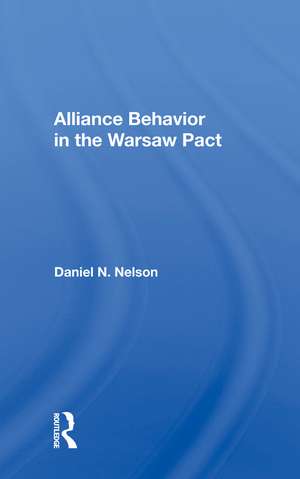Alliance Behavior In The Warsaw Pact
Autor Daniel N. Nelsonen Limba Engleză Hardback – 7 iun 2019
Preț: 764.20 lei
Preț vechi: 1027.43 lei
-26% Nou
Puncte Express: 1146
Preț estimativ în valută:
146.25€ • 152.12$ • 120.74£
146.25€ • 152.12$ • 120.74£
Carte tipărită la comandă
Livrare economică 14-28 aprilie
Preluare comenzi: 021 569.72.76
Specificații
ISBN-13: 9780367010430
ISBN-10: 0367010437
Pagini: 152
Dimensiuni: 141 x 225 mm
Greutate: 0.45 kg
Ediția:1
Editura: Taylor & Francis
Colecția Routledge
Locul publicării:Oxford, United Kingdom
ISBN-10: 0367010437
Pagini: 152
Dimensiuni: 141 x 225 mm
Greutate: 0.45 kg
Ediția:1
Editura: Taylor & Francis
Colecția Routledge
Locul publicării:Oxford, United Kingdom
Cuprins
Introduction -- Warsaw Pact Cohesion* -- The Measurement of East European WTO “Reliability”* -- Burden-Sharing in the Warsaw Pact -- Cohesion, Reliability and Burden Sharing: An Empirical Portrait of the WTO
Descriere
How do alliances, in the aggregate, "behave"? What explains the actions and performance of alliances? Within alliances, how do members' actions and performance vary, and what explains that variance? This book addresses these questions with respect to one of the world's principal alliances of the late twentieth century, the Warsaw Treaty Organization (WTO), also known as the Warsaw Pact. The author argues that though we understand a great deal about the military hardware of the Warsaw Pact, little is known about its reliability, cohesiveness, and the distribution of military burden within it--all key variables, he argues, in influencing change in alliance behavior. In each chapter he offers a new way to measure one of these variables and suggests possible explanations for variance. In addition, he examines the effect East-West relations have on cohesion and how Warsaw Pact allies have distributed the defense effort in the past. A concluding chapter is devoted to an empirical assessment of Warsaw Pact alliance behavior, combining indicators of cohesion, reliability, and burden-sharing in a general portrait of the WTO as a collective actor in international politics.
